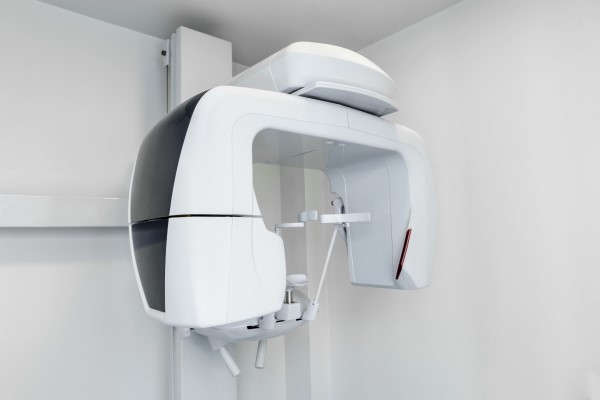What to Expect During a Dental X-Ray

Dental x-rays help with the diagnosis or monitoring of the teeth and the structures that support them. This makes dental x-rays a routine procedure that should happen once a year, give or take. If x-rays are such an important part of dental care, it makes sense to learn about them. Finding out how they work is a good place to start.
Basic information about dental x-rays and how they work
The science behind x-ray imaging is simple. Electromagnetic waves (x-rays) will darken the silver on an x-ray film after they travel through soft tissue. Harder tissue like teeth and bone absorb these waves, which keeps them from reaching the film. The areas of the film that sit directly behind hard tissue remain white. This holds for all kinds of x-rays.
Dentists use x-ray imaging for several reasons:
- To check for cavities
- To monitor the growth and development of the teeth and jaws
- To identify the type and nature of a bad bite
- To use for diagnosing impacted teeth
- To detect abscesses, cysts, and other signs of infection
The information from x-rays helps dentists diagnose issues and create treatment plans that cover different procedures. Orthodontic treatment, wisdom tooth extraction, and root canal therapy are just a few of the many procedures that require x-ray imaging.
The process of getting an x-ray, in a nutshell
First, the dentist or technician will fit an apron around the patient’s torso and neck. They will have the patient bite down on a small plastic or cardboard frame that contains an x-ray film. Next, they will place the x-ray machine by the patient’s cheek and switch it on. The machine will direct x-rays towards the film in the patient’s mouth.
It is possible to substitute x-ray film with a digital sensor that feeds the images directly into a computer. The dentist will take one of the following types of x-ray images:
- Periapical imaging: This is a series of x-rays that show the anatomy of individual teeth, including their support structures. Dentists perform this type of x-ray on new patients
- Bitewing imaging: This type of x-ray creates a single view of the upper and lower molars
- Panoramic imaging: This type of imaging yields a single view of the structures in and around the oral cavity. This includes the teeth, jaws, and sinuses
- Occlusal x-rays: These images show the palate and mouth floor
Sometimes it takes more than one x-ray image to create some of the formats in this list. This means that some types of x-ray imaging take longer than others.
How long it takes to get an x-ray
It depends on how many images the dentist needs. A first-time patient who needs periapical x-rays may need between five and ten minutes from start to finish. The patient who needs an image of their molars will only need two or three minutes.
Here is the breakdown: It takes one minute or less to apply x-rays to the film. It takes another minute to position the film. The dentist or technician will also need a minute to situate their patient and place the apron on their torso.
X-rays and safety
X-ray imaging uses very minimal radiation, similar to the levels that everyone is exposed to when they walk outside. This makes dental x-rays safe, even for pregnant women. The lead apron that covers the torso is protection enough.
Get the all-clear for your mouth with a quick x-ray exam
Routine dental checks are useful in monitoring your oral health and dental x-rays are an important aspect of these checks. You should get an x-ray once a year or as often as your oral health requires. Reach out to us to find out how an x-ray can help to keep tabs on your oral health.
Request an appointment here: https://www.newyorkdentaloffice.com or call New York Dental Office at (212) 548-3261 for an appointment in our New York office.
Check out what others are saying about our dental services on Yelp: General Dentist in New York, NY.
Recent Posts
Regular visits to a general dentist are essential for maintaining optimal oral health. A general dentist is responsible for routine check-ups and cleanings and provides a wide range of services to prevent, diagnose, and treat various dental issues. From preventive care to restorative procedures, a general dentist plays a crucial role in ensuring your teeth,…
A general dentist shared some ways to help prevent bad breath. This is a topic no one wants to discuss. Bad breath happens to everyone at one point or another. If you take proper precautions, you can avoid having bad breath. We should openly talk about this taboo topic. The more we talk about it, the…
A general dentist can relieve a toothache after a proper assessment. This type of dental problem is often accompanied by swelling. It may even occur with a migraine, fever, or earache. Tooth pain needs immediate treatment. Here are the details on what a general dentist can do for a toothache. Each toothache is different. That…
There are many ways that a general dentist can promote gum health. Your gums play an important role in supporting your teeth and providing a barrier against harmful bacteria, so it is critical that they remain healthy and strong. Keeping your gums healthy can also help prevent tooth loss and decrease heart attack risk. The…



